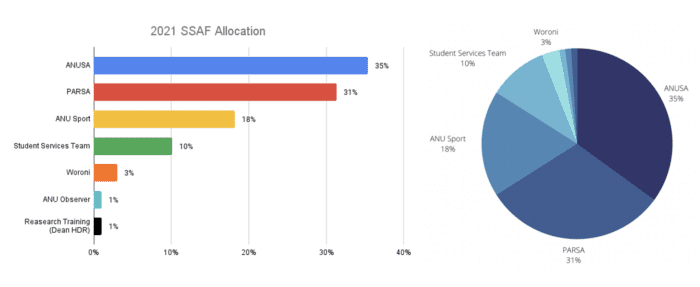What is SSAF?
Have you have ever wondered why you have to pay that $300ish fee on ISIS? Or why you have been locked out of Wattle for forgetting to pay it? All ANU students are obligated to pay the ‘Student Services and Amenities Fee’ (SSAF).
The SSAF was introduced following October 2011, after Parliament passed legislation allowing universities to charge a fee for student services and amenities of a non-academic nature. The money paid through SSAF may be spent by universities on almost anything student services related: staff, grants, events, equipment, rent and more. At ANU, this allows many institutions that we are all familiar with (‘SSAF institutions’) to exist: ANU Sport, ANUSA, PARSA, Woroni, ANU Observer and ANU Thrive. These bodies receive a proposed allocation from the ANU that allows them to create their budgets for the coming year.
How Much Was The 2021 SSAF?
In 2021, the ANU SSAF fee was $313 for full-time students and $156.50 for part-time students. Notably, all students must pay the SSAF unless they are exempt (e.g., students enrolled in transnational offshore programs and inbound exchange students) or are enrolled in programs that are exempt (e.g., the Graduate Diploma of Legal Practice).
What Was The 2021 SSAF Spent On?
In 2021, over $4.5 million dollars was allocated for SSAF spending. The largest allocation went to ANUSA — $1,642,550, representing 35% of the total allocation. Next, PARSA received 31%, ANU Sport — which is only partially funded by SSAF — received 18% and the Student Services Team received 10%. Woroni received 3% and ANU Observer, Research Training and financial management training for student-run organisations each receiving 1%.

SSAF Spending
The above images reflect the results of the 2020 SSAF Survey, which identified that the top two priorities for SSAF funding were ‘student support and advice’ along with ‘health, welfare and wellbeing’. If SSAF allocation is determined similarly to other years, a survey will likely be sent out to students to determine their preferences for allocation. According to the ANU website, these surveys function as a “means of directly contacting all students and letting them express their priorities for the fee”.
We acknowledge the Ngunnawal and Ngambri people, who are the Traditional Custodians of the land on which Woroni, Woroni Radio and Woroni TV are created, edited, published, printed and distributed. We pay our respects to Elders past and present. We acknowledge that the name Woroni was taken from the Wadi Wadi Nation without permission, and we are striving to do better for future reconciliation.
